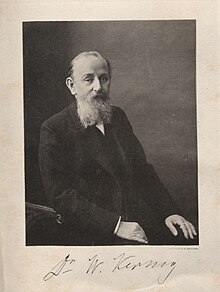Woldemar Kernig
| Woldemar Kernig | |
|---|---|
 |
|
| Born | June 28, 1840 St. Petersburg, Russia |
| Died | April 18, 1917 St. Petersburg, Russia |
| Citizenship | |
| Fields | internal medicine, neurology |
| Institutions | Obuchow Hospital in St. Petersburg |
| Alma mater | University of Tartu |
| Known for | The Kernig's sign, which may indicate subarachnoid haemorrhage or meningitis |
Woldemar Kernig, better known as Vladimir Mikhailovich Kernig (Latvian: Voldemārs Kernigs; Russian: Владимир Михайлович Керниг; June 28, 1840 in St. Petersburg – April 18, 1917 in St. Petersburg) was a notable Russian and Baltic German internist and neurologist whose medical discoveries saved thousands of people with meningitis. He is best known for his pioneering work on diagnostics. Kernig's sign is named after him.
In Kernig's original 1882 publication, he wrote that in patients with meningitis who are seated upright with hips and knees flexed, extending the knee beyond 135 degrees would be painful. Today patients are put into a supine position instead of being seated upright.
...
Wikipedia
